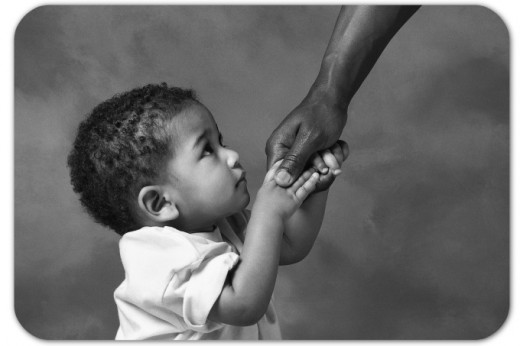
I have a theory about parenting. It’s a reality which only came to me when my boys were nearly grown I had observed it for years — we practiced it — but I only formulated my thoughts around the concept in the teenage years of our parenting.
Here’s the observation.
Many parents try to control less when children are younger and more when they are older.
My theory.
Successful parenting should be the opposite. Control early. Less control later.
I’ll admit. It’s my most “controversial” theory. How dare I suggest we ever control a child! Barbaric. Dictatorial. Borderline child abuse. Let children be who they are designed to be.
I’ve heard all that and more when I submit this theory. And, I’m all for letting children explore, be unique, be themselves. I’d even encourage it.
But, here’s my contention. When our children are toddlers we tend to dismiss the control issue. Sadly this appears to be epidemic in today’s generation of parenting. I hear parents often saying things like, “I can’t get them to take a nap” or “They won’t obey me”. I see it at church when parents won’t leave their toddlers in the preschool area because “they just didn’t want to go today.”
The fact is you can make a toddler comply if you really want them to. You can. You are stronger, bigger, scarier, and smarter than them. You may not feel you are – the little ones can be intimidating– but you are. And, I’m not trying to be funny. I certainly am not advocating abuse. Of course not. I advocate love above all.
But, I do think it’s important – even Biblical – to train a child in the way they should go. And, the time to control your children the way they need to go is when they are young. It may be the only time. You can make decisions for them they don’t have enough life experience yet to make for themselves. You can teach them it’s not okay to throw a temper tantrum. You can. And you can decide where they go and don’t go based on what’s best for them. You can help steer their actions – ultimately their heart – towards thing you know, because of your life experience – are best for them.
That’s what parents do. We raise children – children who will one day be adults.
Here’s the deal and why this matters so much and actually how this whole concept even developed.
Something happens when a child enters their late elementary and middle school years. Our children naturally begin to resist authority. And, if we have this parenting thing backwards what do we do? We attempt to control them even more.
How does that work for a teenager? It doesn’t.
They have more freedom in their schedules. They are stronger, bigger, scarier and smarter than they were as toddlers. They can even pretend to comply and yet do their own thing when parents are nowhere around. The biggest problem with trying to control children into their teenage years is they can completely rebel against our authority. Have you ever known that to be true of a high school or college student?
Many parents release early then try to control later. It doesn’t work. They hang out with the wrong kids. They wear the wrong clothes. They aren’t making wise decisions. The older they get the harder it is to control. At some point your parenting moves from more control to more influence. The key is to control early, things which need controlling – things like heart and character issues – then be able to release gradually as they get older and as they mature.
If you don’t do anything else in your time with your children, help them to know you love them unconditionally. That’s most important. But know you don’t accomplish this by giving into their every wish when they are young. You do it by lovingly guiding them in the right direction through discipline and correction when they are very young. When your children are older, when they need your wisdom perhaps even more, they will continue to seek your input into their life if a trust relationship has been developed.
My encouragement, especially to the parents of younger children, is to instill the values you have for your children when they are very young, while you can still have control, then move to less control and more protection of their hearts through their teenage years. If you have trained them well and they know you love them, then they will continue to honor your influence over them later in life.
For more parenting tips, check out the parenting category of this blog.





 Logging you in...
Logging you in...
 Loading IntenseDebate Comments...
Loading IntenseDebate Comments...
Truly splendid idea for people! People ought to apply this at the earliest opportunity. Coincidentally, As a mother of 7 years Kids John I for one value this written work. Thank you so much.
Great post here. My wife and I have the privilege of being parents to three boys (8YO, 5YO, & 4YO). I know that I am still in the beginning stages of parenting myself, but I think that you are right on with your “theory” here. While I haven’t been parenting my own children by 8 years, I did serve in student ministry for about 15 years. I saw this theory playing out time and again. I would encourage every parent, especially of younger children (like us) to heed the advice from this post. It is a better model that I am convinced will produce the best results. Thanks again for sharing.
Thank you Anthony. And thanks for serving youth.
Great article. Someone once said to me, and I like be it, if our children can’t learn to obey us as parents then you they won’t obey God when they are older.
Great advice! Many people think that little kids are innocent and then they develop bad attitudes as they get older. No. Kids are born sinners, sinning just as greatly as when they are older. They simply need to depend on parents more when they are younger so you don't see it acted out (unless, of course, they are particularly strong-willed – you simply have to smarter than the strong-willed kid).
And it's a question of authority. If you ever hear young kids debate each other, they often say, "Oh yeah? Well my dad says…" Older kids debate with what they have internalized from their parents, teachers, youth pastors, coaches, TV, the Internet, Movies, etc…. If you haven't helped them internalize the Christian faith, the teachings and admonitions of the Scriptures, and your family identity, then they will internalize what they learn from all the other sources out there. That means teaching them early how to see the world through the lens of Scripture, not just through some nightly devotions, but especially as you control how your kids are exposed to the world and how you think through your faith as you approach your life in the world. IF you are their authority early on, it's your responsibility to show them the Sovereignty of God through the authority of the Scriptures. When they get older, that's what they will have internalized and appropriated for themselves, and it will only be cemented by their interaction with the rest of the world.
Great article and very enlightening , thank you .
Thank you.
I agree wholeheartedly with this. I was raised in a household in which we did things because they were expected. Not because we agreed. Not because they were fair. Not because we understood. Because we were children, and our parents told us to.
And I am SO incredibly grateful for that.
I work with younger students all the time who were not raised in that environment, and they are generally more difficult to work with unless the purpose of the task or rule makes sense to them. Frankly, that's not how the world works. And to raise them in a way that leads them to believe that everyone is as spineless or conforming as mommy and daddy is to do them a disservice. Parents are supposed to prepare their children for success…not a rude awakening!
I don't believe in barking at your kids or ordering them around or "controlling" them in any way. I am a firm believer in explaining concepts/rules to children who can use that information to make better decisions. Let's face it, however – no 2 year-old can understand the importance of rules. And if you wait until they DO understand to set the routine in place… well, prepare for a battle.
We don't make our children take naps because they'd rather play. We let them watch tv rather than read a book because it's what makes them happier. And then we wonder why the teenagers are "all about me."
And I can relate to the nursery bit completely. Let's just say… nursery duty has taught me a few things about how NOT to parent children. =
Thank you for reaffirming this concept! I have 2 toddlers…1yr old and a 2 yr old I have felt very strongly about the very idea you express in this post. I have been “lectured” otherwise…but my conviction stands and reading this article has helped me understand that it’s ok! I set boundaries, try hard to be consistent discipline/schedule, let them know church/preschool is the “norm”, and that I love them no matter what and God loves them even more!
I have felt very strongly about the very idea you express in this post. I have been “lectured” otherwise…but my conviction stands and reading this article has helped me understand that it’s ok! I set boundaries, try hard to be consistent discipline/schedule, let them know church/preschool is the “norm”, and that I love them no matter what and God loves them even more!
More!
Thanks Jackie. I appreciate this.
Cool.
I suppose got on my high horse about the "stronger, bigger, scarier" sentence in your blog, that's all.
IMO, capitalising on the stronger, bigger and scarier wears off once the little ones become stronger, bigger and scarier themselves. Then you're in trouble.
And I do trust the "punishment applied" mentioned in your link above does not include physical violence
Al the best,
Steve
Hi Ron,
you say “I believe you must get control early” this still sounds awful to me. Children are automatically eager to please, eager to impress, eager to make you proud. You don’t have to exert control or demand obedience. Clear rules, high praise, the rest works for itself.
It’s just your use of the words ‘contol’ and ‘obedience’ and ‘trained’ that scare me.
If you are talking about demanding your children’s obedience to unexplained rules and boundaries, using negative consequences, then I cannot agree.
If you are talking about positive relationships through clear rules and high praise, then we are probably in agreement.
As to your comment, “Children will naturally resist authority”, well I agree. I accept that a child will resist imposed, unexplained and unfair authority. However, if the child has understanding of ‘the fair rule’, and a hand in the setting of the rule, and a winning stake in the positive outcome of the rule, then you are both onto a winner.
It’s much easier and healthier to foster the love and respect than to set mysterious arbitrary rules and punishments
Obsteve, Yes, I think we are in total agreement. Please read my general model of parenting, called “grace parenting”. https://ronedmondson.com/2008/10/parenting-by-grace.html
I agree with everything you have written.
Thanks,
Ron
So much has to do with personality. I have three kids, 28, 25 and 21 and every single one of them is different. I never had to “control” my daughter who was also the middle child. She never had to be spanked, seldom disciplined, wise and caring. The boys had to be handled differently because they questioned everything. I believe that if children aren’t allowed to make some minor mistakes so they are taught to critical think and experience the consequences of their own decisions they struggle in that transition into adulthood. Of course, total lack of discipline never introduces the consequences…balance is the key. Sometimes we have to put our foot down. But I have seen how too much “control” leads to some very rebellious teens. Choose your battle wisely. A purple mohawk to me is something to laugh with them about, not a reason for argument, punishment or discipline. My motto as a parent is to never assume that your children know something…keep telling them everything. They are born without anything on their hard drive. We want them to download it from reliable sources.
when you say:
"you can make a toddler comply if you really want them to. You are stronger, bigger, scarier, and smarter than they are"
I am reminded of the line in Matilda:
"I'm right and you're wrong, I'm big and you're small, and there's nothing you can do about it."
structure your children's learning? yes
model good examples for them? yes
demand obedience? no.
you big bully.
Steve
I disagree with you Steve, but I love you commenting. I believe you must get control early. I am certainly not a bully…well maybe I am….
I know you don’t know me, but you should know I have 2 awesome young men who think I’m also their best friend today, so I stand on the fact that at least in my case…it worked.
Hmm, control…. I agree that parents need to be in charge and our kids want us to be even though they expend a tremendous amount of energy trying to convince us otherwise. But control… I think as parents we have to accept that in the end, our kids have free will and while we might be able to force them in the behaviors we want, we can't actually control them.
That said, my kids aren't "baked" yet so I don't feel like I can speak about parenting with much authority. Let me see first if I spend my son's college fund on bail and then I'll get back to you.
Well, I think we may be differing on terminology. I'm okay if you use "in charge" and I use "control". I just know if you don't have control when they are 2, you'll have a much harder time influencing when they are 13. And, I do speak with a fairly good track record. My 19 and 22 year old would agree. And, yes, children do have free will.
I agree with you. I feel that my values are worthy enough to help my children learn about and take them as their own values. So I have rules and yes my kids have to comply with the rules. I have 3 wonderful young adult children who now thank me for helping them learn those values. I have also had teachers tell me that my kids are great examples to other students without being "goody-two-shoes" about it. I didn't bully my kids. I set rules and I also lead by example.
demanding obedience of little onces does not equal bullying.
children need to learn about respecting authority. we are their authorities when they are little. we are the most loving authority (besides God) that will ever be in their lives. if they do not learn to respect our authority, they will not learn to respect other authories (i.e. teachers). and then, we are failing them as parents.
Thank you, Ron!! We parents of young ones need guidance! I have recently been asking alot of questions of people who are more experienced parents that I trust about their experiences and advice. They majority are all saying what you have said here in your post. It can be really hard to be strict with the little ones because they are so cute and helpless, but we can already tell that our little Jayda is benefiting from our loving discipline. She is sleeping so much better at bedtimes and naps
Twitter: Benreed
says:
As a parent of a young child, I really appreciate this post, Ron. Thanks.
This post is really what you’ve done for so many years with your own children. You say “it’s just come to me recently” but you’ve lived this philosophy with parenting, and you’ve got two sons who love you to prove it works. Thanks for the post, and for the example you’ve left.
Ben Reed’s last blog post..John Piper and Michael Jackson?